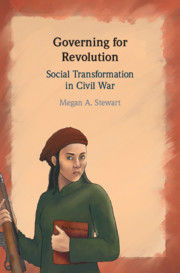Book contents
- Governing for Revolution
- Governing for Revolution
- Copyright page
- Dedication
- Contents
- Figures
- Map
- Tables
- Acknowledgments
- Abbreviations
- 1 Introduction
- 2 Iron and Blood
- 3 Rebel Goals Determine Governance Strategies
- 4 Research Design and Alternative Explanations
- 5 The Eritrean Liberation Struggle
- 6 Changing Goals and Changing Governance
- 7 Modeling Revolutionary Governance in East Timor
- 8 Hezbollah
- 9 A Statistical Analysis of Rebel Goals and Rebel Governance
- 10 Conclusion
- References
- Index
2 - Iron and Blood
The Global-Historical Context of Rebel Governance Strategies
Published online by Cambridge University Press: 05 March 2021
- Governing for Revolution
- Governing for Revolution
- Copyright page
- Dedication
- Contents
- Figures
- Map
- Tables
- Acknowledgments
- Abbreviations
- 1 Introduction
- 2 Iron and Blood
- 3 Rebel Goals Determine Governance Strategies
- 4 Research Design and Alternative Explanations
- 5 The Eritrean Liberation Struggle
- 6 Changing Goals and Changing Governance
- 7 Modeling Revolutionary Governance in East Timor
- 8 Hezbollah
- 9 A Statistical Analysis of Rebel Goals and Rebel Governance
- 10 Conclusion
- References
- Index
Summary
This chapter explains the global-historical context in which rebel leaders make decisions about how to govern. The chapter argues that although rebel groups have undertaken governance for centuries, they have frequently saved costly and potentially burdensome governance projects until after war ends. Mao Tse-Tung and the Chinese Communist Party (CCP), however, knowingly and repeatedly introduced burdensome and occasionally perilous governance during war, in addition to some more popular projects. By the 1930s, the CCP had begun propagating this governance strategy globally as a model for later rebel groups. The CCP’s eventual victory provided a larger platform to disseminate information about its experience and governance strategy, including introducing a training program for would-be and active rebel leaders. As a result of the CCP’s efforts, the international system was saturated with information about the CCP’s approach to governance. The CCP’s efforts made a strategy for relatively more burdensome wartime governance cognitively available to later rebel leaders, and it is within this international informational structure that rebel leaders make decisions about governance.
Keywords
- Type
- Chapter
- Information
- Governing for RevolutionSocial Transformation in Civil War, pp. 27 - 42Publisher: Cambridge University PressPrint publication year: 2021



